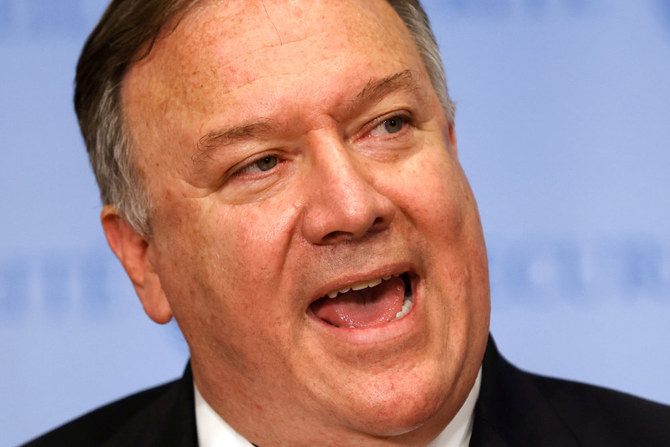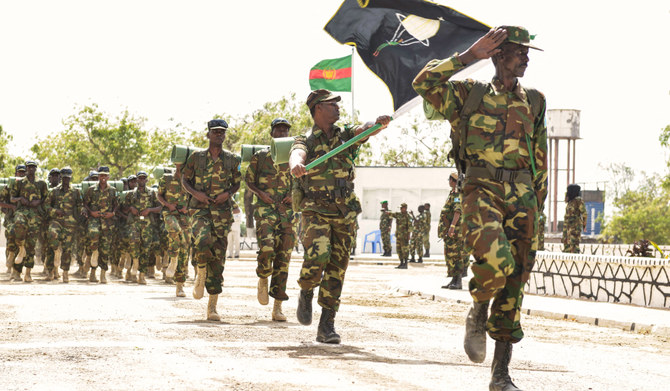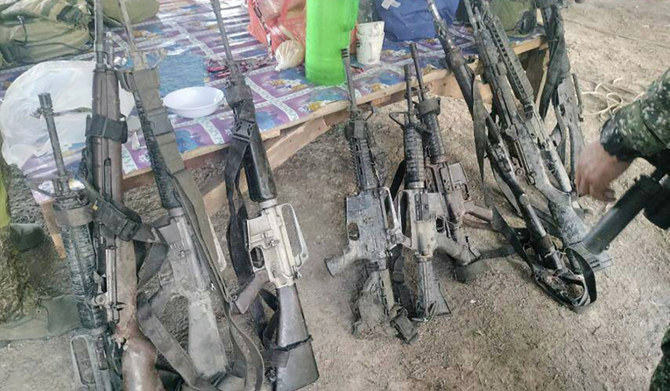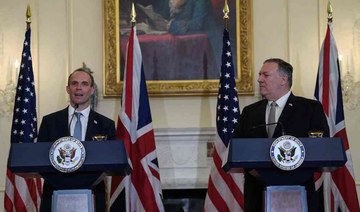WASHINGTON: The Trump administration declared Saturday that all UN sanctions against Iran have been restored, a move most of the rest of the world rejects as illegal and sets the stage for an ugly showdown at the world body ahead of its annual General Assembly.
The administration said that its triggering of the “snapback” mechanism in the UN Security Council resolution that enshrined the 2015 Iran nuclear deal had taken effect at 8 p.m. Eastern Time. That is 30 days after Secretary of State Mike Pompeo notified the council that Iran was in “significant non-performance” with its obligations under the accord, known as the Joint Comprehensive Plan of Action, or JCPOA.
“The United States took this decisive action because, in addition to Iran’s failure to perform its JCPOA commitments, the Security Council failed to extend the UN arms embargo on Iran, which had been in place for 13 years,” Pompeo said in a statement released at precisely 8 p.m.
“In accordance with our rights ... we initiated the snapback process to restore virtually all previously terminated UN sanctions, including the arms embargo,” he said. “The world will be safer as a result.”
The White House plans to issue an executive order on Monday spelling out how the US will enforce the restored sanctions, and the State and Treasury departments are expected to outline how foreign individuals and businesses will be penalized for violations.
“The United States expects all UN, member states to fully comply with their obligations to implement these measures,” Pompeo said. “If UN, member states fail to fulfill their obligations to implement these sanctions, the United States is prepared to use our domestic authorities to impose consequences for those failures and ensure that Iran does not reap the benefits of UN-prohibited activity.”
But the US move faces stiff opposition from the other members of the Security Council who have vowed to ignore it. They say the US lost legal standing to invoke snapback when President Donald Trump withdrew from the nuclear deal in 2018 and reimposed American sanctions on Iran. The US argues it retains the right to do it as an original participant in the deal and a member of the council.
Even before the US declaration, fellow Security Council members said the declaration had no legal force, calling into question the ability to enforce snapback. Snapback means that international sanctions eased or lifted by the nuclear deal are reimposed and must be enforced by UN member states, including hitting Iran with penalties for uranium enrichment to any level, ballistic missile activity and buying or selling conventional weapons.
Those bans were either removed or set to expire under the terms of the deal in which Iran was granted billions of dollars in sanctions relief in return for curbs on its nuclear program.
China and Russia have been particularly adamant in rejecting the US position, but US allies have not been shy either. In a letter sent Friday to the president of the Security Council, Britain, France and Germany — the three European participants who remain committed to the deal — said the US announcement “is incapable of having legal effect and so cannot bring in to effect the procedure.”
“It flows from this that any decisions and actions which would be taken based on this procedure or on its possible outcome would also be incapable of having any legal effect,” they wrote. Thus, the three countries said, the sanctions relief provided by the nuclear deal will remain in place.
US officials have talked tough about their intentions to ensure the sanctions are enforced, but it remains unclear how the administration will respond to being ignored, particularly by its European allies, which have pledged to keep the nuclear deal alive. A wholesale rejection of the US position could push the administration, which has already withdrawn from multiple UN agencies, organizations and treaties, further away from the international community.
In the midst of a heated campaign for reelection, Trump plans to address Iran in a speech to the General Assembly’s annual high-level meeting on Tuesday. Officials say he will also touch on his brokering of agreements for Israel and the United Arab Emirates and Bahrain to normalize relations in part to solidify a regional bulwark against Iran.
And, as he seeks to demonstrate statesmanlike credentials ahead of the election, Trump has injected another element of uncertainty into the mix by threatening to retaliate “1,000 times” harder against Iran if it attacks US personnel overseas.
Iran earlier Saturday warned that it may still strike US interests to avenge the death of a top Iranian general in an American airstrike earlier this year. But the head of the country’s Revolutionary Guard Corps mocked a report that it was plotting to assassinate the US ambassador to South Africa, saying Iran’s response would target people directly or indirectly involved in the general’s death.
Amid uncertainty over that, the other 14 members of the Security Council and all but about five of the UN‘s 195 member states say the US lost its legal standing to act on sanctions when Trump withdrew from the nuclear accord more than two years ago.
Pompeo traveled to the United Nations on Aug. 20 to formally notify the Security Council that the US was triggering snapback because Iran is not complying with the nuclear deal. He dismissed suggestions that the administration was engaged in anything legally questionable or even controversial.
He has said the snapback mechanism was the “one thing that the previous administration got right” in the nuclear deal that Trump has denounced as the worst deal ever negotiated. Yet, aside from Israel and the Gulf Arab states, almost no country in the world agrees with the US
Trump administration officials have been attacking the 2015 nuclear deal for years. They say it is fatally flawed because certain restrictions on Iran’s nuclear activity gradually expire and will allow the country to eventually develop atomic weapons.
The immediate concern of the US has been the indefinite extension of the arms embargo that would otherwise expire on Oct. 18. The Security Council rejected a US effort to extend the embargo in a lopsided vote which saw the United States get support from only one country, the Dominican Republic.
US says all UN sanctions on Iran restored
https://arab.news/ryf8z
US says all UN sanctions on Iran restored

- “Snapback” mechanism in the UN Security Council resolution that enshrined the 2015 Iran nuclear deal had taken effect at 8 p.m. Eastern Time, says Pompeo
Somalia detains US-trained commandos over theft of rations

- The US agreed in 2017 to help train and equip the 3,000-strong Danab to act as a quick-reaction strike force against Al-Shabab
MOGADISHU: Somalia’s government said it had suspended and detained several members of an elite, US-trained commando unit for stealing rations donated by the US, adding that it was taking over responsibility for provisioning the force.
The Danab unit has been a key pillar of US-backed efforts to combat the Al-Qaeda-linked militant group Al-Shabab. The US agreed in February to spend more than $100 million to build up to five military bases for Danab.
Somalia’s Defense Ministry said in a statement that it had notified international partners of the theft and would share the outcome of its investigation.
A US official said in a statement to Reuters that Washington takes all corruption accusations seriously.
“We look forward to engaging with the Danab on creating the necessary safeguards and accountability measures to prevent future incidents that could affect future assistance,” the official said, without directly addressing whether any US support had already been suspended.
The US agreed in 2017 to help train and equip the 3,000-strong Danab to act as a quick-reaction strike force against Al-Shabab.
The group has been waging an insurgency against the central government since 2006.
Danab has been heavily involved in a military offensive by the Somali military and allied clan militias since 2022 that initially succeeded in wresting swaths of territory from Al-Shabab in central Somalia.
However, the campaign has lost momentum, with the government-allied forces struggling to hold rural areas and Al-Shabab continuing to stage large-scale attacks, including in the capital Mogadishu.
Washington suspended some defense assistance to Somalia in 2017 after the military could not account for food and fuel.
The US also conducts frequent drone strikes targeting Al-Shabab militants.
Kenya flood death toll since March climbs to 70

- Tanzania Prime Minister Kassim Majaliwa said on Thursday that more than 200,000 people had been affected by the disaster, with 155 fatalities and 236 people injured
NAIROBI: The number of people killed in floods in Kenya due to heavier than usual rainfall since the start of the monsoon in March has risen to 70, a government spokesperson said on Friday.
In recent weeks, Kenya and other countries in East Africa — a region highly vulnerable to climate change — have been pounded by heavier-than-usual rainfall compounded by the El Nino weather pattern.
El Nino is a naturally occurring climate pattern typically associated with increased heat worldwide, leading to drought in some parts of the world and heavy rains elsewhere.
BACKGROUND
Kenyans have been warned to stay on alert, with the forecast for more heavy rains across the country in the coming days as the monsoon batters East Africa.
“The official tally of fellow Kenyans who regrettably have lost their lives due to the flooding situation now stands at 70 lives,” government spokesperson Isaac Mwaura said on X after torrential rains killed more than a dozen people in the capital, Nairobi, this week.
Mwaura said the government would issue a “comprehensive brief” following a meeting with the national emergency response committee after the extreme weather caused chaos across Nairobi this week, blocking roads and engulfing homes in slum districts. Kenyans have been warned to stay on alert, with the forecast for more heavy rains across the country in the coming days as the monsoon batters East Africa.
At least 155 people have died in neighboring Tanzania due to flooding and landslides.
Tanzania Prime Minister Kassim Majaliwa said on Thursday that more than 200,000 people had been affected by the disaster, with 155 fatalities and 236 people injured.
He said homes, property, crops, and infrastructure such as roads, bridges, railways, and schools had been damaged or destroyed.
In Burundi, one of the poorest countries on the planet, around 96,000 people have been displaced by months of relentless rains, the United Nations and the government said this month.
Meanwhile, the UN humanitarian response agency, OCHA, said in an update this week that in Somalia, the seasonal Gu rains from April to June are intensifying, with flash floods reported since April 19.
It said four people had been reportedly killed and more than 800 people affected or displaced nationwide.
Uganda has also suffered heavy storms that have caused riverbanks to burst, with two fatalities confirmed and several hundred villagers displaced.
Late last year, more than 300 people died in torrential rains and floods in Kenya, Somalia, and Ethiopia, just as the region was trying to recover from its worst drought in four decades that left millions of people hungry.
From October 1997 to January 1998, massive flooding caused more than 6,000 deaths in five countries in the region.
Jewish campaign group led by Gideon Falter cancels London march over safety concerns

- The Campaign Against Antisemitism says safety concerns forced it to call off its “Walk Together” march after receiving threats from ‘hostile actors’
- Last weekend, a video appeared to show police prevent ‘openly Jewish’ Falter from walking near a pro-Palestine protest but a longer version of the footage painted a different picture
LONDON: The organizers of a march in protest against antisemitism, planned for Saturday in London, “reluctantly” announced on Friday that they were canceling the demonstration.
The Campaign Against Antisemitism said it was forced by safety concerns to call off its “Walk Together” march, which was scheduled to coincide with the latest in a series of pro-Palestine marches in the British capital. The organization said it had expected thousands of people to take part but threats from “hostile actors” posed a safety risk.
“We have received numerous threats and our monitoring has identified hostile actors who seem to have intended to come to any meeting locations that we announced,” the CAA said.
“The risk to the safety of those who wished to walk openly as Jews in London tomorrow as part of this initiative has therefore become too great.
“We are no less angry about these marches than our Jewish community and its allies. We want to walk.”
The group added that it wants the Metropolitan Police not only to “manage marches” but “police” them.
Last weekend, a video that circulated on social media sparked controversy as it showed a confrontation between the CAA’s chief executive, Gideon Falter, and a Metropolitan Police officer who appeared to be preventing him from crossing the road in the vicinity of a pro-Palestine march in London because he was “openly Jewish” and his presence was “antagonizing.”
Falter, who was threatened with arrest if he did not leave the area, criticized the police for their actions during the incident and claimed there were now “no-go zones for Jews” in London amid a rise in antisemitic sentiment arising from Israel’s war on Gaza following the Oct. 7 attacks by Hamas.
Police chiefs apologized twice for the officer’s choice of words. However, a former senior police officer said on Monday that the initial, short version of the video most people saw online “did not fully represent the situation.”
A longer version showed the officer expressing concern about Falter’s actions because he appeared to be deliberately attempting to provoke the pro-Palestinian demonstrators.
Berlin police clear pro-Palestinian camp from parliament lawn

- Police dismantled tents, forcibly removed protesters and blocked the surrounding area to stop others arriving
- "The idea was to draw attention to that and ... to the German complicity and active enabling of the Israeli genocide in Gaza," the camp organizer, Jara Nassar, said
BERLIN: Berlin police on Friday began clearing a pro-Palestinian camp set up in front of the German parliament by activists demanding the government stop arms exports to Israel and end what they say is the criminalization of the Palestinian solidarity movement.
Police dismantled tents, forcibly removed protesters and blocked the surrounding area to stop others arriving.
The action followed clashes between demonstrators and police on US campuses and a blockade at Paris’s Sciences Po university, part of international protests to decry Israel’s military campaign in Gaza and Western support for Israel.
The Berlin camp ‘Besetzung Gegen Besatzung’ — ‘Occupy Against Occupation’ — began on April 8, coinciding with the start of International Court of Justice hearings in Nicaragua’s case against Germany for providing military aid to Israel.
“The idea was to draw attention to that and ... to the German complicity and active enabling of the Israeli genocide in Gaza,” the camp organizer, Jara Nassar, told Reuters.
Israel strongly denies accusations that its offensive in Gaza, which aims to destroy the Palestinian militant group Hamas, constitutes a genocide.
Nassar and a dozen protesters sat on the ground, chanting pro-Palestinian slogans and songs as police with loudspeakers called on them to leave.
“We look at what is happening in the US ... with admiration. There is no reason to believe we should stop now,” said Udi Raz, a PhD student at Berlin’s Free University and a member of the Jewish Voice association.
Raz, who wore a Jewish kippah with the Palestinian flag colors and held his phone in a live social media broadcast of the clearance, said Jewish activists had joined the camp and held a candle-lit Passover dinner there this week.
Police said the prohibition order for the camp, which had been granted authorization at the start of the protest, was due to repeated violations committed by some protesters, including the use of unconstitutional symbols and forbidden slogans.
“Protection of gatherings cannot be guaranteed at this point because public safety and order are significantly at risk,” police spokesperson Anja Dierschkesaid said, adding tents had to be moved daily under local regulations to maintain the lawn.
“For the German government, grass matters more than the lives of more than 40,000 innocent people in Gaza murdered by the Israeli military,” Raz said.
Philippine police kill an Abu Sayyaf militant implicated in 15 beheadings and other atrocities

- A confidential police report said that Abdulsaid had been implicated in at least 15 beheadings in Basilan, including of 10 Philippine marines in Al-Barka town in 2007 and two of six kidnapped Vietnamese sailors near Sumisip town in 2016
MANILA: Philippine forces killed an Abu Sayyaf militant, who had been implicated in past beheadings, including of 10 Filipino marines and two kidnapped Vietnamese, in a clash in the south, police officials said Friday.
Philippine police, backed by military intelligence agents, killed Nawapi Abdulsaid in a brief gunbattle Wednesday night in the remote coastal town of Hadji Mohammad Ajul on Basilan island after weeks of surveillance, security officials said.
Abu Sayyaf is a small but violent armed Muslim group, which has been blacklisted by the US and the Philippines as a terrorist organization for ransom kidnappings, beheadings, bombings and other bloody attacks. It has been considerably weakened by battle setbacks, surrenders and infighting, but remains a security threat particularly in the southern Philippines, home to minority Muslims in the predominantly Roman Catholic nation.
Abdulsaid, who used the nom de guerre Khatan, was one of several Abu Sayyaf militants who aligned themselves with the Daesh group.
A confidential police report said that Abdulsaid had been implicated in at least 15 beheadings in Basilan, including of 10 Philippine marines in Al-Barka town in 2007 and two of six kidnapped Vietnamese sailors near Sumisip town in 2016. The Vietnamese were seized from a passing cargo ship.
He was also involved in attacks against government forces in 2022 and a bombing in November that killed two pro-government militiamen and wounded two others in Basilan, the report said.
Abdulsaid was placed under surveillance in February, but police forces couldn’t immediately move to make a arrest because of the “hostile nature” of the area where he was eventually gunned down, according to the report.
On Monday, Philippine troops killed the leader of another Muslim rebel group and 11 of his men blamed for past bombings and extortion in a separate clash in a marshy hinterland in Datu Saudi Ampatuan town in southern Maguindanao del Sur province, the military said.
Seven soldiers were wounded in the clash with the members of the Bangsamoro Islamic Freedom Fighters.
The Abu Sayyaf and the Bangsamoro Islamic Freedom Fighters are among a few small armed groups still struggling to wage a separatist uprising in the southern Philippines.
The largest armed separatist group, the Moro Islamic Liberation Front, signed a 2014 peace pact with the government that eased decades of sporadic fighting.
Moro Islamic Liberation Front rebel commanders became parliamentarians and administrators of a five-province Muslim autonomous region in a transition arrangement after signing the peace deal. They are preparing for a regular election scheduled for next year.




















